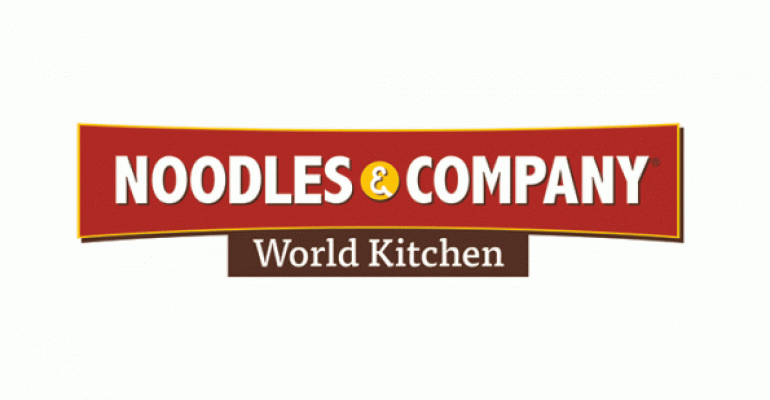Noodles & Co. has a new management team. Soon it could have a new name.
The Broomfield, Colo.-based fast-casual chain is thinking of dropping the “and Company” from its moniker. It is testing “Noodles World Kitchen” in some markets, in the hopes that reducing confusion could help the chain’s name recognition and, as a result, its sales.
“Ultimately, we think the brand is a phenomenal brand with tremendous staying power,” said Dave Boennighausen, who was named permanent CEO this week. “But ‘& Company’ began to be a bit more confusing than we’d like it to be. Our brand has craveable global flavors of noodles and pasta. We wanted to promote the world kitchen aspect of the brand.”
Boennighausen has been with Noodles since 2004, when he joined the company’s finance department. He worked his way up to CFO by 2012. Last year, he was named interim CEO when his boss, Kevin Reddy, stepped down.
Boennighausen will receive substantial help at the helm of the company, thanks to the arrival of Paul Murphy, who was named executive chairman.
Murphy, the soon-to-be-former CEO of Del Taco Restaurants Inc., opted to leave that company so he could relocate to Denver.
Murphy will work full time at Noodles, and Boennighausen will report directly to him, with the rest of the organization reporting to Boennighausen. Murphy brings with him some strong bona fides, including strong same-store sales improvement at Del Taco — where he led its evolution from a low-cost Mexican concept into more premium territory.
“Culturally, he’s a good complement,” Boennighausen said. “He will guide and mentor the team as we work on our initiatives, helping us to get as high a return as we can on the brand.
“We’re very excited to have him on board. It’s fortunate the way the timing worked out.”
Boennighausen and Murphy will have a tall task. The chain has not lived up to the hype of its much-anticipated initial-public offering in 2013. Its stock price more than doubled on its first day of trading from its introductory price of $18 a share — besting the 2006 performance of fellow Colorado chain Chipotle Mexican Grill Inc.
The IPO helped usher in an era of ultra-high valuations for fast-casual restaurant companies. And in subsequent months investors pushed Noodles’ price as high as $47 per share.
Yet Noodles never lived up to the hype. That stock price began falling, largely on weak same-store sales and weaker profits.
The chain reported an operating loss of $21 million in 2015 and another $67.5 million in 2016 and $25.7 million in the first quarter of this year.

Many of the company’s new stores opened with weak unit volumes, often much less than the company’s $1.1 million. Restaurant profit margins, which had been 21 percent the year before the company went public, declined steadily, to just 12.8 percent last year.
Earlier this year, Noodles closed 55 underperforming locations, or more than 10 percent of its 528 locations at the time. The company could not afford the costs associated with the closures, and had to rely on an infusion of cash from private equity groups L Catterton and Mill Road Capital.
Today, Noodles is trading under $3.50 per share. The stock is down more than 16 percent this year.
Still, the closures and the new capital helped to shore up the balance sheet, Boennighausen said, enabling the company to pursue its sales and operational efforts.
One of the first initiatives was to cut items from the menu. The chain had added a number of menu items in recent years. The company cut the number of entrees from 26 down to 18, getting rid of items such as sandwiches while preserving its core noodle items and salads and soups.
The menu cut helped improve operations by simplifying the concept. “We saw the need to improve operations and make it easier to execute,” Boennighausen said, noting that turnover improved “dramatically” in recent quarters, in part because of the simplicity.
That simplicity has helped new locations open better. Noodles has slowed its development considerably. It expects to open 12 to 15 locations this year after opening 50 to 60 in recent years. The new locations are largely in existing markets.
The most recent class of new restaurants, Boennighausen said, are opening at 120 percent of the chain’s average unit volumes.
Meanwhile, the company hopes it can build sales by taking advantage of existing restaurant trends, notably off-premise sales. As it is, 46 percent of Noodles sales are eaten outside the restaurants.
The company is working on delivery, with plans to expand that throughout the country the rest of the year. The company is also planning a loyalty program later this year. And it is working to improve the company’s communications to improve brand awareness.
One thing that could help is the name. When you name a chain Noodles, there’s little getting away from that. And Noodles denotes different ethnicities in different parts of the country. The chain wants to know that it represents many of them.
“That’s a challenge,” Boennighausen said. “Ultimately, there are plenty of people who are very comfortable eating noodles and pasta. But the biggest priority is to note the world kitchen. When people think of the name Noodles, they think Asian or Italian depending on the region of the country.”
The “World Kitchen,” he said, could get people thinking of multiple cuisines, rather than just one.
Contact Jonathan Maze at [email protected]
Follow him on Twitter at @jonathanmaze

